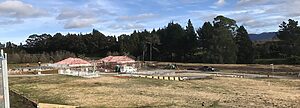


Out with the Old, In with the New

Launch Sequence
Step-by-step legal programme for startups

All together for a new CLM look
Cooney Lees Morgan has been delivering legal excellence for over a century, with roots reaching back to 1918.

CLM’s Modern Legacy
Celebrating Over a Century of Legal Excellence

Is your family trust romance proof?
When love and romance are involved, it’s not always easy to discuss what the future may hold if things don’t go to plan. Our family law team can provide expert advice that carefully treads the fine line between asset protection and family relationships.

Honouring family relationships and the law
Our seven specialists in the area of family law have over 90 years of combined experience.

Game Changing Bills?

The Law Between Laws

Big Changes Coming to the Disputes Tribunal in 2026!

Trustee Turmoil? What to Do When Trustees Turn Hostile

Five tips for first home buyers
The prospect of buying your first home can be daunting. The best advice is to find a helpful property lawyer who can explain the process and assist you along the way. In the meantime we’ve put together our top five tips below to get you started.

Dreaming of a slice of paradise? What overseas buyers should keep in mind when buying residential land in NZ.
One Year On: Overseas Persons Restricted From Buying Residential Land In New Zealand

Effects of Indemnity and Limitation of Liability Clauses in Contracts
When entering a contract, it is important that you understand what you are entering into and what clauses are in your best interests to either edit, add or remove from the contract.

Preparation Preparation Preparation
Most people recognise that they need to see their lawyer to plan for key events in their life.

Can I contest a Will?
It’s surprisingly common for family members to be left out of a person’s will.

October 2025 Sustainability update
In this October 2025 update, we consider the resetting of methane targets by the Government, and what this means for farmers.

On-again, off-again relationships. What will happen to our relationship property?
Figuring out where you stand after an on-again, off-again relationship can feel confusing, especially when it comes to dividing relationship property. Whether you were in a “qualifying relationship” or not will significantly change the outcome of any separation.

Successful Succession: effective strategies for business continuity
For family businesses, succession planning is a complex and oftentimes emotionally challenging process.

Responsibilities for water service contributions are shifting. How does it affect you?
Shifting development contribution powers under the the new local government water services act 2025

Break Free Sooner: New Divorce Law Explained
A new law came into force on 17 October 2025 that means some family violence victims will be able to immediately apply for their marriage to be dissolved.

Will a trust protect my relationship property?
Many Kiwis set up a family trust believing it will safeguard their assets if a relationship breaks down. The truth is more complicated – while trusts can offer some protection, recent legal cases have shown they’re far from bulletproof.

How Can I Keep “Bank of Mum and Dad” Money Safe From My Partner?
The “Bank of Mum and Dad” is now the fifth biggest lender in New Zealand when it comes to buying a home according to Consumer NZ.

The FMA safety net has limits when it comes to wholesale investor groups
In a recent notable ruling, the High Court of New Zealand struck out negligence claims brought by a minority group of wholesale investors against the Financial Markets Authority (FMA), following the collapse of the Du Val Group.

What to consider with shared ownership of land
When a property is owned by two or more people, there are two methods for holding shared ownership of the Title. The two methods of legal ownership are: Joint ownership or Tenancy in common.

What to Consider Before Undertaking a Subdivision
Are you thinking about undertaking a subdivision? Whether it be a simple two lot subdivision, or a large scale subdivision with multiple lots, you need to ensure you have considered the following matters: